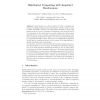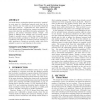60 search results - page 9 / 12 » Self-stabilizing byzantine agreement |
ASIACRYPT
2010
Springer
13 years 4 months ago
2010
Springer
We consider the round complexity of a basic cryptographic task: verifiable secret sharing (VSS). This well-studied primitive provides a good "test case" for our understan...
WDAG
2007
Springer
14 years 1 months ago
2007
Springer
Consider a distributed network of n nodes that is connected to a global source of “beats”. All nodes receive the “beats” simultaneously, and operate in lock-step. A scheme ...
WDAG
2005
Springer
14 years 28 days ago
2005
Springer
Randomness is a critical resource in many computational scenarios, enabling solutions where deterministic ones are elusive or even provably impossible. However, the randomized solu...
CCS
2010
ACM
13 years 7 months ago
2010
ACM
A network latency estimation scheme associates a "position" to every peer in a distributed network such that the latency between any two nodes can be accurately estimate...
CORR
2007
Springer
13 years 7 months ago
2007
Springer
We provide new and tight lower bounds on the ability of players to implement equilibria using cheap talk, that is, just allowing communication among the players. One of our main r...


